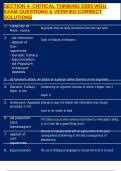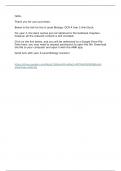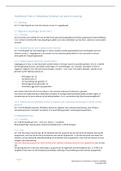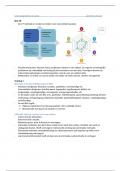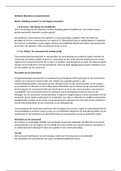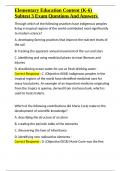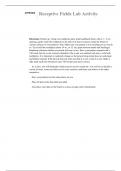Iyengar, S. & Lepper, M. (2000). When Choice is Demotivating: Can One Desire Too Much
of a Good Thing? Journal of Personality and Social Psychology, 79 (6), 995-1006.
Current psychological theory and research affirm the positive affective and motivational
consequences of having personal choice. These findings have led to the popular notion that
the more choice, the better – that the human ability to manage, and the human desire for,
choice is unlimited. This study challenges this implicit assumption.
A lot of previous studies have shown that the provision of choices increases intrinsic
motivation and enhances performance on a variety of tasks. These studies show that
the more choice, the better.
This study investigates whether there are some limitations for this literature. The
previous studies were relatively small, the choice between 2 or 6 options for example.
But what happens when the range of choices becomes bigger?
- Large numbers of choices should increase the likelihood that people will be successful
in their search. BUT: growing body of research have shown that people can have
difficulties managing complex choices.
o The choice becomes harder when alternatives are also interesting. Consumers
experience conflict, choose the default option, or don’t even choose something.
Choice overload hypothesis in this article: although the provision of extensive choices may
sometimes still be seen as initially desirable, it may also prove unexpectedly demotivating in
the end.
Study 1: Try out booth in supermarket with 6 or 24 versions of jam bottles.
People were more attracted to the booth with 24 versions of jam (extended).
People who were exposed to the limited versions of jam, purchased way more
compared to the people who’ve seen the extended version.
Veel opties zijn dus in eerste instantie meer aantrekkelijk, maar dit verlaagt wel de
aankoopbereidheid.
Study 2: 6 or 30 choices between assignment topics
Student with the limited choice, performed better on content and receiving higher grades.
Study 3: Students had no option to choose, limited amount to choose from, or extensive
amount.
Participants in the limited group were significantly more likely to choose chocolate as
compensation.
,Lecture 1 – Introduction
What is consumer psychology?
In general terms, consumer behavior is a psychologically based study of how individuals
make buying decisions and what motives them to make a purchase.
Several facets on consumer behavior exist, such as:
- How a consumer feels about certain brands, products, or services
- What motivates a consumer to pick one product over another and why
- What factors in a consumer’s everyday environment affect buying decisions or brand
perceptions and why?
More than just products (going to the dentist, what tv-programs to watch).
Marketing management decisions are based on assumption regarding the psychology of
the consumer.
Products don’t build brands => Consumers do! (Je kan alles goed doen volgens het boekje,
maar vervolgens moeten je klanten wel kopen. Dus je moet goed weten, hoe en waarom je
klant wil kopen. Wat wil je klant?).
What drives these consumption decisions?
- Financial resources
- Beliefs
- Emotions
- Psychological states
- Environment
Experiments allows investigators establish cause-and-effect relationships. In other words,
investigators can isolate different effects by manipulating an independent variable, and
keeping other variables constant, to see how it influences a specific outcome variable.
Does having a lot of options to choose from make us happy? => NO! Too many options can
give us stress. At first it seems nice, but in the end, we are less satisfied.
The paradox of choice – there is a sweet spot for the number of choices which leads to the
most happiness.
,Intuition isn’t always right. In fact, sometimes it is exactly wrong.
In essence, choice overload refers to a cognitive process in which people have a difficult time
making a decision when faced with many options. There are a few reasons for this:
1. It becomes more difficult/stressful to determine which option is the best one for you.
2. As humans, we inherently feel sorrow about the opportunities that we forego (vanaf zien).
3. Moreover, when it’s not clear which option is best for you, you’re more likely to regret the
decision that you eventually made.
Article: When choice is demotivating: can one desire too much of a good thing?
Choice overload can leave you dissatisfied with the choice you made, what is often described
as ‘buyer’s remorse’. Or it can even lead to behavioral (choice or decision) paralysis, which
is a situation ‘where people are faced with so many choices that they can’t decide among
them and make no choice at all’.
When are consumers most likely to feel overwhelmed by their options? We are not always
experiencing choice overload.
Four conditions under which consumer may experience choice overload:
1. When people don’t have the time and want to make a quick and easy choice =>
decision-task difficulty
2. When the product is complex => choice-set complexity
3. When you don’t have any prior information => preference uncertainty
4. When the goal is to purchase as opposed to browse => decision goal
Choice-set: How are options organized? Dominant option? What information is provided
about each option?
Decision-task: Must made quickly? Longer time available? The lesser time, more overload.
Preferences-uncertainty: Do you know what you want? More you know, easier choice.
Decision goal: Buying or browsing?
, How can Marketeers help reduce choice overload?
Filter on website
Most popular items
Create dominant option (Coolblue’s choice)
Compare options on website’s (Coolblue)
Categorizing
Previous purchases
Free return (for regret and pressure)
Too much choice leads to choice-overload (buyers remorse or choice paralysis), if you as a
retailer can’t facilitate consumer decision making process in a sea of choices.
But, marketers can facilitate things to reduce the choice-overload.

